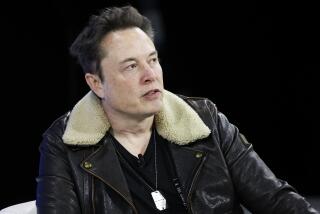Google baits the competition
SUN VALLEY, IDAHO — Continuing a recent tradition, Google Inc. Chief Executive Eric Schmidt held court with the press Thursday at the Allen & Co. conference in Sun Valley, Idaho, where he called the current economy “the new normal.”
Companies need to “figure out how to be happy and get our lives together in this new configuration,” Schmidt said, adding, “You can’t waste money, credit is tight.”
Schmidt, who was joined by Google co-founder Larry Page, spoke on a variety of topics, including Apple Inc. CEO Steve Jobs’ health, concerns about Google’s power in Washington and whether Twitter and Facebook are hurting the Internet search giant.
Schmidt, who is on the board of Apple, said he was “well informed” about Jobs’ condition. He declined to comment on whether Apple should have been more forthcoming about Jobs, who underwent a liver transplant that was not disclosed to shareholders until after it was performed.
As for regulators’ worries about Google’s market power, Schmidt said competitors are trying to stir things up. “We now expect governments to look at what we’re doing,” he said. “We respect their role.”
Schmidt said he still believes in MySpace, the struggling social networking site owned by News Corp. that Google struck a $900-million advertising deal with several years ago. “We like MySpace a lot,” Schmidt said, although he declined to say whether his company would renew the ad deal when it expires next year.
Schmidt expressed admiration for Hulu, the video site that carries episodes of new and old TV shows and whose owners include News Corp., NBC Universal and Walt Disney Co.
He said he hoped to get more professional content on YouTube, the Google-owned site that is dominated by amateur videos. Asked when YouTube, which Google acquired in 2006 for $1.65 billion, would make money, Schmidt said he wouldn’t make predictions. Page added that a timeline for its profitability was “just not that important.”
The tone of the conference on Day 3 continued to be somber. On a panel about global management, General Electric Co. Chief Executive Jeff Immelt lamented the state of education in the U.S., complaining that his company has to go outside the country for the best people. As for the economy, Martin Sorrell, the chairman and chief executive of advertising conglomerate WPP Group, told reporters, “We don’t see things improving.”
News Corp.’s Rupert Murdoch was also bearish. “I’m shocked at the business mood,” he told his Fox Business Network. “It’s going to take years and years, like five years at least, before we see any real growth coming out of this.”
The conference was not without its light moments. Microsoft Corp. Chairman Bill Gates was walking out to lunch past a gaggle of reporters who were asking about Google’s plans to launch an operating system to rival Windows when a voice behind him said, “Better if you not comment.” It was Google’s Schmidt.
Sony Corp. Chief Executive Howard Stringer may have had the best quip of the day. Asked about the success of Twitter and other social networking sites, Stringer said: “A lot of people are doing very well at making very little money. It’s not a club I’m looking to join.”
--







